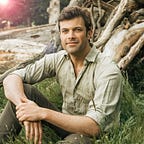Where’s The Risk in Patience?
We humans aren’t particularly good at patience. Yet, it is a quality that is modelled beautifully in the other than human world. What can we learn from nature about waiting and patience? It’s a pertinent question, one that has been forced upon us by nature itself with this pandemic.
It is also a question that I was asked on a great podcast recently hosted by Catriona Horey and Elizabeth Wainwright called Unfurling. Here is the episode on Waiting and Patience if you would like to listen.
A bear I met in the wilderness of Colorado the year before last taught me what it means to really value something. He stood by my food in the middle of the night, and waited until I could no longer find the energy to defend it. I left the food and went to bed knowing I could always get a resupply, if needed. The bear, however, didn’t have the luxury of this choice. Consequently, he placed more value on the food than I did, which gave him an increased capacity for risk, for patience and for trust.
Nothing is taken for granted in the wilderness, and everything happens in its own time.
But in the human centric world we live in many of us, including myself, have more than what we need in a material way and with this, bizarrely, comes more impatience. We all know when something is scarce we tend to value it more highly, and when we have too much of something we tend to take it for granted. Over abundance can be a poison chalice that makes for a comfortable life at the material level, at the risk of a dissatisfying and vacuous one at a deeper level.
When we live in a distorted world where much of what we need is ‘on tap’, as it is for many of us in wealthy countries, we can actually experience more distrust and more fear. We have more to ‘lose’, or so we believe. How can we truly trust when we are disconnected from the sensitivities and seasons of our natural world; when we don’t have to wait in suspense to see if the rain, the sun or the frost will bring riches or ruin?
Despite our best efforts, we can’t actually de-risk life. If we try to, we risk the richness of life itself. What is life if we don’t value what we have? How can we know abundance, if we don’t know scarcity? How can we honour our life if we don’t accept our mortality? Or honour our health, if we can’t be with disease? Or new beginnings, if we don’t accept endings? These polarities are the very fabric of our world and must be embraced, rather than pushed in to the shadows. We can’t keep engineering our environment to only manifest one side of a polarity, it will only give us more of what we are avoiding.
Life without trust is exhausting. I know this from personal experience. We need to embrace discomfort and risk and all those things which are not within our control. As we come out of our winter lockdown we might ask ourselves how our lives have improved given the risks and pain we may have experienced these past months? What are we willing to be patient for? How might we stay in relationship with what’s important so we will always know its value?
